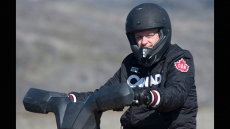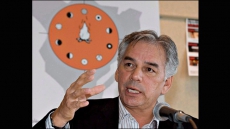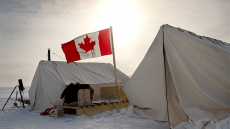TORONTO - The Ontario legislature passed a bill Thursday aimed at reducing car insurance premiums an average of 15 per cent by next August from where they were in the summer of 2013.
The government said rates have fallen about six per cent since it first introduced the bill, which is aimed at tackling fraud to lower costs for insurance companies and "is expected to help lower insurance rates" for Ontario drivers.
"We want to make sure people with clean records get the benefit of the cost reductions that are going to be imposed now by this piece of legislation," said Finance Minister Charles Sousa. "And they should be seeing, on average, a rate reduction of 15 per cent because that's what we're trying to fight for."
Sousa said 21 of the 120 auto insurance companies in Ontario have already lowered their premiums an average of 10 per cent in just over a year.
The New Democrats forced the then-minority Liberal government to agree to legislate a 15-per-cent cut in car insurance premiums over two years in exchange for allowing the 2013 budget to pass.
But the NDP voted against the insurance bill Thursday, insisting it was a bad deal for motorists because it takes away their right to sue if accident benefits are denied.
"Removing more protections for people is not the right way to go," said NDP critic Jagmeet Singh. "It's a significant loss of our rights, and this is not a good bill."

The NDP said insurance companies saved $2 billion when the Liberals changed regulations in 2010 to cut the cap on payouts for routine accident claims in half, and can afford to pass the savings on to drivers in the form of lower premiums.
"These benefit reductions are ongoing, not a one-time thing, and are going to continue forever," said Singh. "So the insurance industry has more than enough profits, more than enough room to provide the 15 per cent reduction."
The Progressive Conservatives supported the legislation, but doubted the Liberals would be able to achieve 15-per-cent cuts in premiums by next August after they failed to meet the eight-per-cent reduction goal set for this past year.
"They're not on target, and admitted today they are at six per cent," said PC finance critic Vic Fedeli. "Much like missing their revenue targets, they've already missed this insurance rate-reduction target, but it is a step forward and that's why we voted in favour of it."
The bill will help people injured in collisions settle claims faster by moving a dispute resolution system from Ontario's insurance regulator to an existing tribunal run by the Attorney General's office, which the industry has said would eliminate one step in the appeals process.
It also calls for more oversight of the billing practices of health clinics that treat accident victims, and allows only licensed service providers to be paid directly by insurers.
There are also new rules governing tow truck operators and vehicle storage yards to keep drivers better informed about where their car is towed after an accident and how much they will be charged for every day it stays there, added Sousa.
"This bill requires the owner to have a say where that car goes and where it's stored," he said.
The Ontario government will also look at the idea of making winter tires mandatory on passenger cars, as Quebec does, to help reduce accidents and lower insurance claims.
"We are dealing with the insurance companies to see if that could provide for greater reductions in their premiums," said Sousa.





